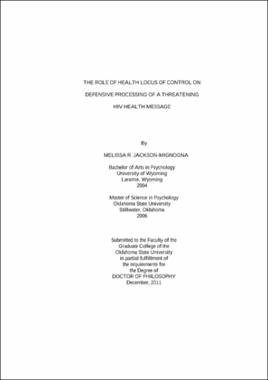| dc.contributor.advisor | Leffingwell, Thad Ryan | |
| dc.contributor.author | Jackson-Mignogna, Melissa | |
| dc.date.accessioned | 2013-11-26T08:27:40Z | |
| dc.date.available | 2013-11-26T08:27:40Z | |
| dc.date.issued | 2011-12 | |
| dc.identifier.uri | https://hdl.handle.net/11244/6950 | |
| dc.description.abstract | Scope and Method of Study: Research has continually shown that when individuals receive threatening health messages that contain personally relevant information, they show a greater tendency to be critical than if the message contained favorable information. The purpose of the study was to determine if presenting a threatening health message regarding the threat of experiencing superinfection (also known as reinfection) would lead to defensive processing in a sample of HIV positive men. Superinfection is a relatively new phenomenon documented among people living with HIV, referring to the ability to spread treatment-resistant mutations of HIV to sexual or intravenous drug-using partners. Inheriting a treatment-resistant form of HIV can result in limiting a person's options for antiretroviral treatment and potentially lead to a faster AIDS progression rate. Another purpose of this study was to determine if individuals' perceived control over changing behaviors which lead to negative health conditions, or health locus of control, affects the tendency to exhibiting defensive bias. Participants were recruited from the lobby of an internal medicine clinic and rewarded 10 for participating. Each participant completed questions about sexual and drug-use risk behaviors and health locus of control. Next they were asked to read an article linking risky behaviors to the phenomenon of superinfection. Finally, participants answered questions capturing their beliefs and attitudes about the risk of superinfection, and estimated their own degree of risk for experiencing this phenomenon. | |
| dc.description.abstract | Findings and Conclusions: The presentation of a threatening health message was not shown to affect defensive processing. Participants did not engage in the typical pattern of defensive processing previously demonstrated in the literature. Instead, regardless of degree of risk, participants generally rated the phenomenon of superinfection as very important and serious to HIV positive men's health. Additionally, participants estimated their own risk as low. Since participants were not shown to exhibit defensive processing in this study, the second hypothesis regarding health locus of control could not be tested. | |
| dc.format | application/pdf | |
| dc.language | en_US | |
| dc.rights | Copyright is held by the author who has granted the Oklahoma State University Library the non-exclusive right to share this material in its institutional repository. Contact Digital Library Services at lib-dls@okstate.edu or 405-744-9161 for the permission policy on the use, reproduction or distribution of this material. | |
| dc.title | Role of health locus of control on defensive processing of a threatening HIV health message | |
| dc.contributor.committeeMember | Grice, James W. | |
| dc.contributor.committeeMember | Wingate, LaRicka R. | |
| dc.contributor.committeeMember | Harrist, Steve | |
| osu.filename | JacksonMignogna_okstate_0664D_11903 | |
| osu.accesstype | Open Access | |
| dc.type.genre | Dissertation | |
| dc.type.material | Text | |
| dc.subject.keywords | defensive bias | |
| dc.subject.keywords | defensive processing | |
| dc.subject.keywords | health locus of control | |
| dc.subject.keywords | hiv infection | |
| dc.subject.keywords | msm (men who have sex with men) | |
| thesis.degree.discipline | Psychology | |
| thesis.degree.grantor | Oklahoma State University | |
